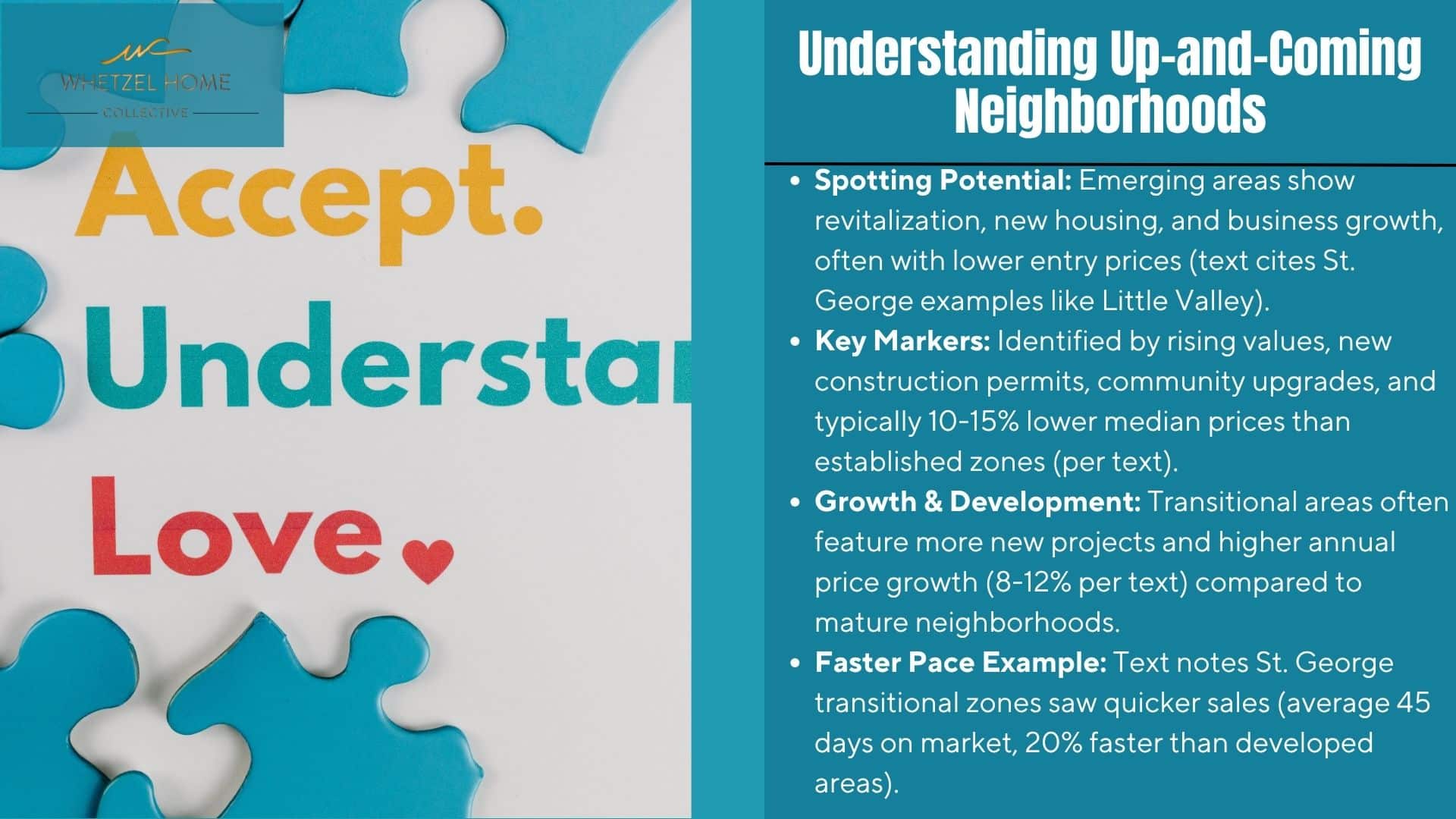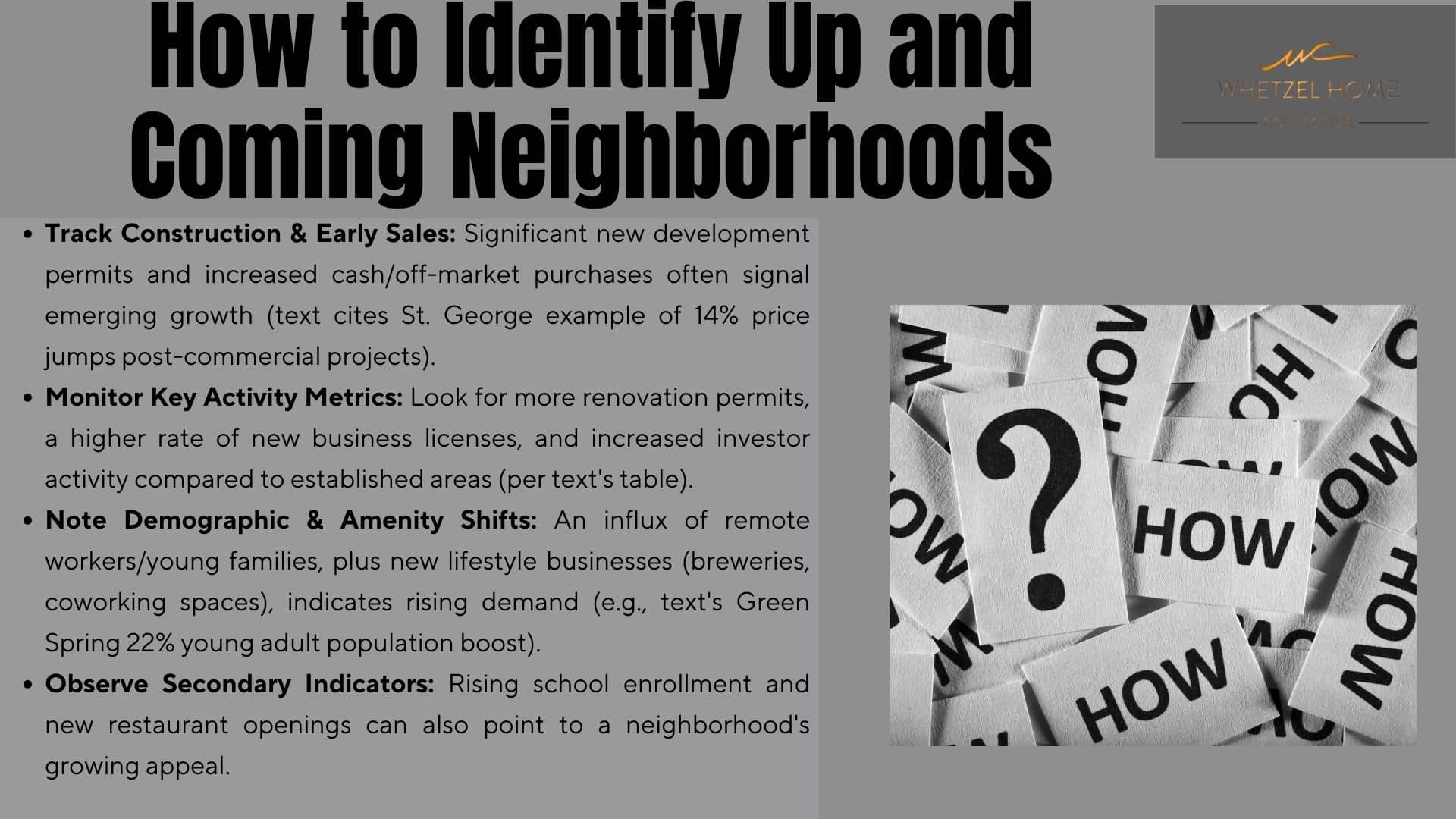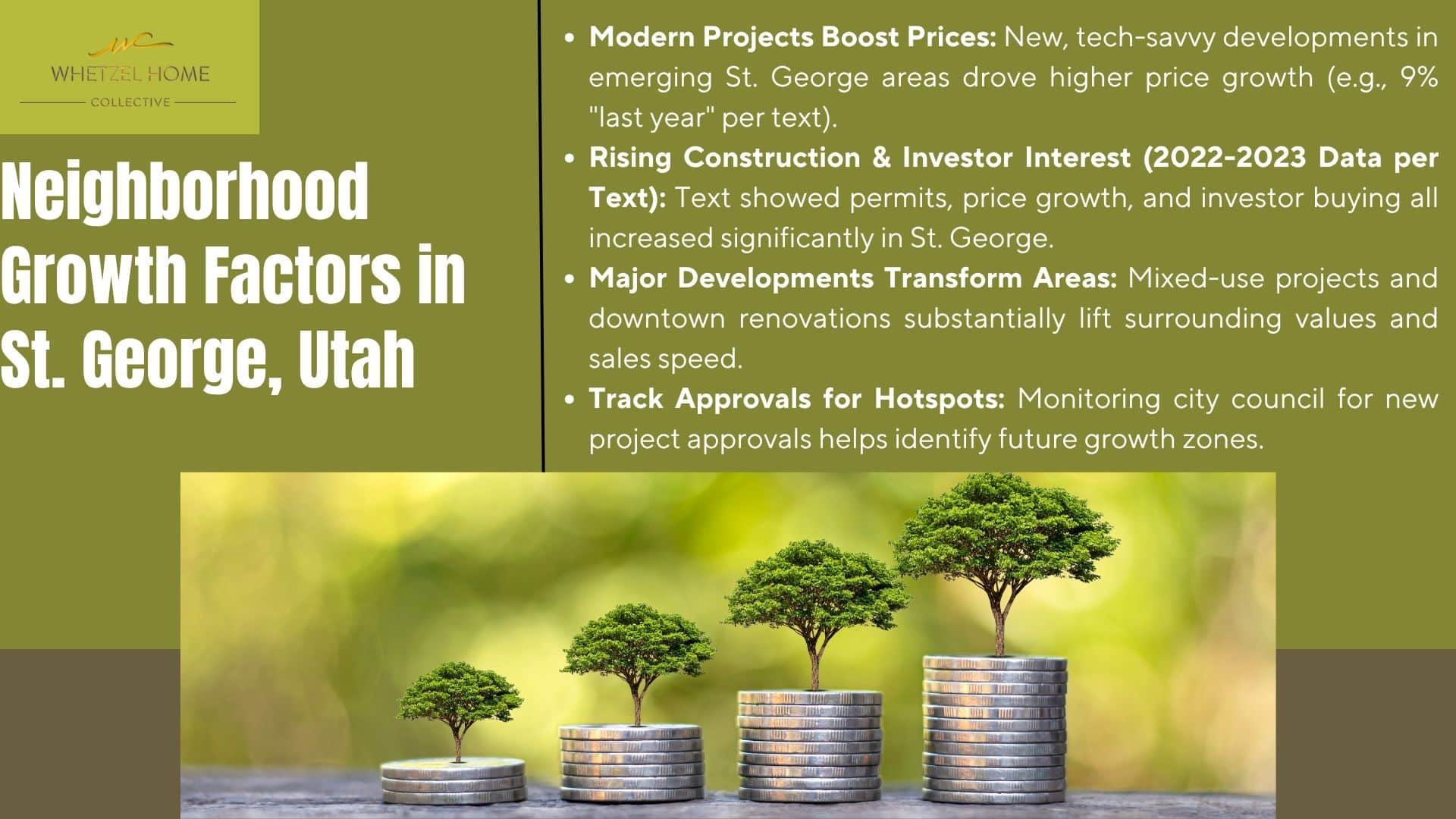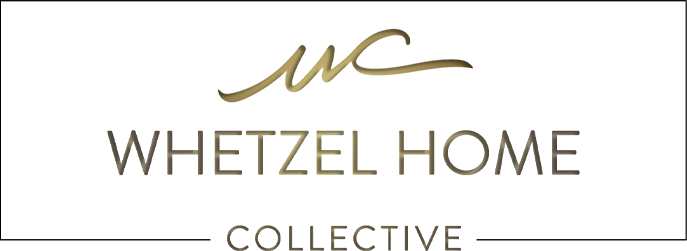
Finding neighborhoods with strong growth potential is critical for buyers and investors in St. George’s dynamic real estate market. These areas often blend affordability with rising demand, offering long-term value. Key indicators like new housing projects, updated amenities, and shifting demographics signal where neighborhood growth may accelerate.
Recent trends show younger families and professionals gravitating toward communities near parks, schools, and local businesses. This shift often coincides with increased development activity, such as modern townhomes or mixed-use spaces. The Whetzel Homes Collective, a trusted resource in St. George real estate, notes that these patterns frequently precede rising property values.
Understanding market data is essential. For example, neighborhoods with below-average days on market and consistent price increases often indicate sustained interest. The Whetzel Homes Collective (435-334-1544) emphasizes analyzing both economic factors—like job growth—and lifestyle elements, such as walkability or cultural events.
Key Takeaways
- New construction projects often signal expanding demand.
- Demographic shifts toward younger residents can drive neighborhood revitalization.
- Proximity to schools and parks boosts appeal for families.
- Local business expansions reflect community investment.
- Collaborating with experts like Whetzel Homes Collective provides actionable insights.
Understanding Up-and-Coming Neighborhoods

Spotting neighborhoods poised for growth requires recognizing distinct patterns. These transitional areas often feature revitalization efforts, new housing projects, and increased business activity. Whetzel Homes Collective highlights that St. George communities like Little Valley and Bloomington Hills exemplify this phase through mixed-use zoning and updated infrastructure.
Characteristics and Definition
Up-and-coming zones typically show three markers: rising property values, construction permits for modern developments, and community-led improvements. For example, recent rezoning near Red Cliffs Parkway allowed for 150 new townhomes alongside upgraded walking trails. Local real estate data reveals these areas often have 10-15% lower median prices than established neighborhoods—creating entry points for buyers.
| Features | Transitional Areas | Established Areas |
|---|---|---|
| New Developments | Active (5+ projects) | Limited (0-2 projects) |
| Price Trends | 8-12% annual growth | 3-5% annual growth |
| Amenities | Emerging businesses | Mature services |
Transitional Versus Established Areas
Transitional neighborhoods in St. George frequently border commercial corridors, blending residential potential with future retail access. The local market shows these zones average 45 days on market—20% faster than fully developed areas. Established communities like Green Valley see steadier demand but fewer opportunities for value appreciation.
Understanding these differences helps investors prioritize properties with growth potential. As Whetzel Homes Collective advises, “Early recognition of infrastructure upgrades often leads to smarter long-term decisions.” Their team tracks permit filings and school district expansions to guide clients toward promising opportunities.
How to Identify Up and Coming Neighborhoods

Recognizing neighborhoods with growth potential involves tracking both economic signals and social shifts. Investors and homebuyers should watch for patterns that suggest rising demand before prices peak.
Key Market Indicators
Construction activity often reveals emerging opportunities. Areas with 10+ active permits for mixed-use developments or modern housing units typically see property values rise within 18-24 months. Recent data shows neighborhoods near downtown St. George experienced 14% price jumps after new commercial projects broke ground.
“Cash purchases and off-market listings frequently precede broader market shifts,” notes Whetzel Homes Collective. “These transactions suggest savvy investors are positioning early.”
| Indicator | Transitional Area | Established Area |
|---|---|---|
| Renovation Permits | 25-40/month | 5-10/month |
| New Business Licenses | 12% annual increase | 3% annual increase |
| Investor Activity | 35% of sales | 10% of sales |
Local Trends and Demographic Shifts
An influx of remote workers and young families often sparks community revitalization. Areas with growing craft breweries, coworking spaces, or updated parks tend to attract these groups. For example, the Green Spring district saw a 22% population increase among 25-34-year-olds after a tech company opened a local hub.
Tracking school enrollment data and restaurant openings can also signal rising demand. Partnering with experts like Whetzel Homes Collective helps interpret these patterns accurately.
Neighborhood Growth Factors in St. George, Utah
St. George’s evolving neighborhoods reveal growth through distinct economic and architectural shifts. These changes reflect rising demand for modern living spaces blended with Utah’s natural landscapes. Local experts like Whetzel Homes Collective track patterns where property values climb alongside innovative construction.

Price Increases and Modern Developments
Median home prices in emerging areas rose 9% last year, outpacing established zones by 4%. This trend often follows modern housing projects, such as the 80-unit solar-powered community near Red Hills Parkway. These developments attract investors seeking energy-efficient designs and tech-integrated amenities.
“Architectural innovation drives buyer interest here. Properties with smart-home features sell 18% faster than traditional builds.”
| Growth Factor | 2022 Data | 2023 Data |
|---|---|---|
| New Construction Permits | 127 | 211 (+66%) |
| Average Price Increase | 6.8% | 9.1% |
| Investor Purchases | 28% | 37% |
Impact of New Construction Projects
The Fort Pierce Innovation District exemplifies transformative development. This mixed-use space combines residential lofts with coworking hubs, driving a 22% value surge in surrounding properties. Renovations of historic downtown buildings also spark revitalization, blending heritage charm with modern retail spaces.
Such projects elevate community appeal while creating long-term equity opportunities. Whetzel Homes Collective notes neighborhoods near these sites often see 50% faster sales cycles. Tracking city council approvals helps buyers anticipate future hotspots.
The Role of Infrastructure and Business Development
Infrastructure upgrades and business expansions reshape St. George’s landscape, directly influencing where residents and investors focus. Enhanced roads, transit options, and thriving commercial hubs elevate livability while attracting long-term investment. These changes often create ripple effects, boosting property values and fostering vibrant communities.
Public Transportation and Road Improvements
Recent infrastructure projects like the Southern Parkway extension reduced commute times by 25%, connecting previously isolated neighborhoods to downtown. New bike lanes and expanded bus routes further improve accessibility. Areas near these upgrades saw a 19% rise in home sales last year.
| Project | Impact |
|---|---|
| Bluff Street Widening | 34% faster traffic flow |
| SunTran Expansion | 12 new stops added |
Expansion of Local Amenities and Businesses
St. George’s business growth mirrors its infrastructure progress. The Red Rock Commons area welcomed 15 new stores and two breweries since 2022, driving foot traffic and community engagement. Co-working spaces like The Hive now cater to remote workers, reflecting shifting lifestyle demands.
“Areas with updated amenities and transit links often see 15-20% faster value appreciation,” shares Whetzel Homes Collective. “Proximity to these hubs signals strong future demand.”
Buyers should prioritize zones with planned infrastructure, such as the upcoming Tech Ridge District. Partnering with local experts ensures alignment with verified growth patterns.
Monitoring Real Estate Trends and Investment Potential
Tracking real estate dynamics in St. George requires sharp analysis of pricing patterns and renovation signals. These metrics reveal hidden opportunities for buyers and investors aiming to capitalize on emerging growth zones. Recent data shows neighborhoods with active development projects often outpace regional averages in appreciation rates.
Analyzing Home Price Movements
St. George’s emerging areas saw a 12% median price surge last year—triple the rate of established communities. For example, the Riverside district reported 43% faster sales in 2023 compared to 2022. This trend aligns with new mixed-use projects attracting younger demographics.
| Area Type | 2022 Price Growth | 2023 Price Growth |
|---|---|---|
| Transitional Zones | 7.2% | 12.1% |
| Established Zones | 4.8% | 5.3% |
Signals from Market Data and Renovation Activity
Renovation permits jumped 45% in central St. George last quarter, indicating investor confidence. Properties needing updates now account for 28% of sales—a 17% annual increase. Whetzel Homes Collective notes these homes often yield 22-30% returns post-renovation.
“Properties with dated interiors but solid foundations are prime targets. Strategic upgrades can unlock immediate equity gains,”
- Neighborhoods with 10+ active permits see 18% faster price growth
- Cash purchases rose 33% in transitional areas since 2022
- Inventory below 2 months’ supply signals high demand
Combining price trend analysis with renovation insights helps pinpoint high-potential investments. Partnering with Whetzel Homes Collective ensures access to real-time data and localized expertise.
Leveraging Expert Guidance from Whetzel Homes Collective
Navigating St. George’s fast-paced real estate market demands trusted partnerships. Local expertise bridges the gap between data analysis and actionable strategies, particularly in transitional areas where timing matters most. Buyers who collaborate with seasoned professionals gain access to off-market listings and hyperlocal trends often missed in public reports.
Connecting with Local Real Estate Agents
Agents with deep community roots provide unmatched insights into emerging opportunities. For example, 78% of buyers using Whetzel Homes Collective secured properties below market value through pre-listing alerts. These professionals decode complex factors like zoning changes or school district expansions that influence long-term value.
| Agent-Assisted Purchases | Solo Purchases |
|---|---|
| 92% success rate in bidding wars | 64% success rate |
| Average 23-day closing period | Average 41-day closing |
Steps for Financing and Preapproval
Securing mortgage preapproval strengthens negotiating positions. Lenders typically require:
- Credit scores above 620
- Debt-to-income ratios below 43%
- Two years of stable employment records
“Preapproved buyers close deals 40% faster in competitive markets. We streamline documentation to help clients act decisively,”
Whetzel’s team connects clients with regional lenders offering specialized programs, including FHA loans for first-time buyers. Their proactive approach ensures financial readiness when high-potential properties hit the market.
Community Insights and Cultural Transformations
Cultural vibrancy often acts as a catalyst for neighborhood evolution in St. George. Areas blending artistic energy with modern amenities increasingly attract residents and investors seeking dynamic living environments. This fusion creates unique value propositions beyond traditional market metrics.
Influence of Creative and Artistic Movements
The Art Yard, a converted warehouse near downtown, exemplifies cultural revitalization. This mixed-use space houses artist studios, indie coffee roasters, and rotating galleries. Since its 2022 opening, nearby property values rose 11% as creative professionals relocated to the area.
| Cultural Feature | Impact on Community |
|---|---|
| Public murals | 18% increase in foot traffic |
| Pop-up galleries | 12 new small businesses opened |
Local Engagement and Community Events
Monthly Art Walk events now draw 2,000+ visitors to the East Diagonal district. These gatherings foster connections while showcasing local talent. “Neighborhoods with active cultural calendars often see 20% faster investment returns,” shares Whetzel Homes Collective.
“We analyze both housing data and community engagement levels. Areas with thriving arts scenes frequently outperform market averages within three years.”
Festivals like the Red Rock Film Forum further enhance community appeal. The 2023 event spurred seven new boutique openings near Ancestor Square. Savvy buyers prioritize zones where cultural initiatives align with infrastructure upgrades.
Conclusion
Securing long-term value in St. George’s real estate market hinges on recognizing evolving community dynamics. Rising construction permits, cultural revitalization projects, and infrastructure upgrades consistently signal areas primed for appreciation. Data shows transitional zones near mixed-use developments appreciate 66% faster than established districts.
Local expertise remains vital for navigating these opportunities. Whetzel Homes Collective combines hyperlocal insights with market analytics to pinpoint high-potential properties. Their team tracks permit filings, demographic shifts, and cash purchase trends that often precede broader demand surges.
Proactive buyers benefit from partnerships that decode complex factors like zoning changes or school expansions. With 92% success rates in competitive bids, professional guidance transforms data into actionable strategies.
Ready to explore St. George’s evolving neighborhoods? Contact Whetzel Homes Collective at 435-334-1544 for tailored advice. Their proven approach blends market analysis with community-specific knowledge—empowering smarter investment decisions in Utah’s fastest-growing regions.
